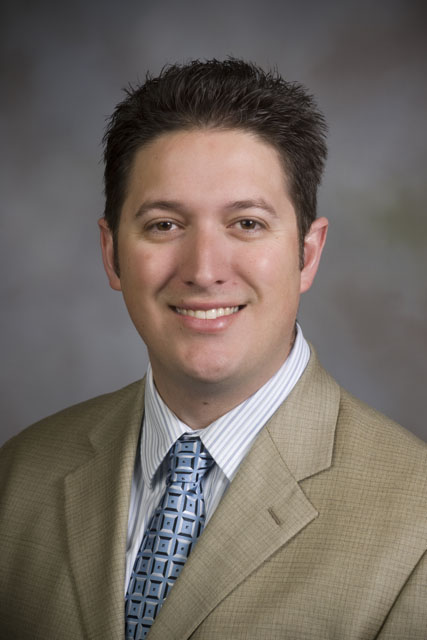David Schmale receives 2010 Sporn Award for Excellence in Teaching Introductory Subjects

David G. Schmale III of Blacksburg, Va., assistant professor of plant pathology, physiology, and weed science in Virginia Tech's College of Agriculture and Life Sciences, received the 2010 Sporn Award for Excellence in Teaching Introductory Subjects.
The annual award recognizes a Virginia Tech faculty member who teaches introductory-level courses. Students submit the nominations. Award recipients are selected by a committee composed of student representatives from the Omicron Delta Kappa and Golden Key honor societies as well as the faculty member who won the award the previous year. Award winners receive $2,000 and are inducted into the university's Academy of Teaching Excellence.
The award was established in memory of Dr. and Mrs. Philip J. Sporn and is sponsored by the Center for Instructional Development and Educational Research and the Virginia Tech Academy for Teaching Excellence. Sporn was a Virginia Tech alumnus and president and chief executive officer of American Electric Power Company.
After joining the Virginia Tech faculty in 2006, Schmale began developing an undergraduate course for a broad audience in the area of mycology – the study of fungi – and its impact on society. First offered in spring 2007, the Mysterious Mushrooms, Malicious Molds course provides students from a wide range of disciplines with an introduction to the historical and practical significance of fungi as sources of medicine, food, and drink, as well as dangerous toxins, mind-altering chemicals, and plant/animal pathogens. During the popular course, students form small groups to cultivate edible varieties of mushrooms.
Students in the Mysterious Mushrooms, Malicious Molds class praised Schmale as "courteous, charismatic, enthusiastic," as well as "very creative, very funny" and a “passionate, devoted, and inspiring professor."
"Dr. Schmale is not only a faculty member that educates in an expressive way, he is also a brilliant researcher who performs groundbreaking discoveries in his field," wrote one student. "You can tell that he is excited about the subject matter he teaches, and that excitement exudes into the classroom and captivates the attention of his students."
Another student added, “His teaching is absolutely captivating, catchy, and memorable. Today I actually told a story to my roommate that Dr. Schmale shared with our class a year ago. I kept every single page of notes, didn't miss a single class, enjoyed our text, and loved his teaching style."
Schmale is known for his use of autonomous, or self-controlled, unmanned aerial vehicles (UAVs) to track airborne microorganisms tens to hundreds of meters above the Earth's surface. Currently, UAVs are being used in a project supported by the National Science Foundation to better understand how fungi in the genus Fusarium are transported over long distances in the atmosphere. Shane Ross, assistant professor of engineering science and mechanics in the College of Engineering, is partnering with Schmale on this project. Schmale's interdisciplinary research program bridges plant pathology, aerobiology, and crop and food safety and security.
In addition, Schmale teaches about fungal pathogens of plants as a co-instructor in the graduate-level course Plant Pathogenic Agents. Next fall, he will also teach part of a new course, Microbial Forensics and Biosecurity, led by Boris Vinatzer, assistant professor of plant pathology, physiology, and weed science.
Schmale received his bachelor's degree in biological sciences at the University of California, Davis, and his doctorate in plant pathology at Cornell University.




